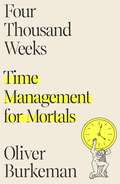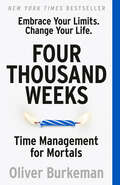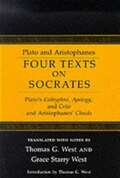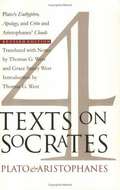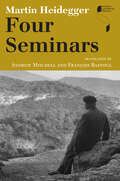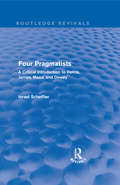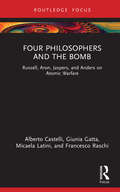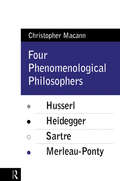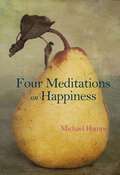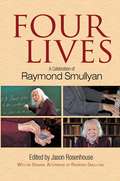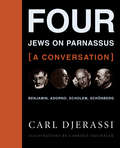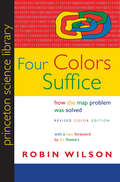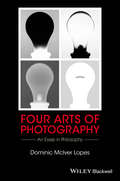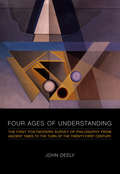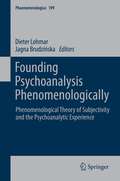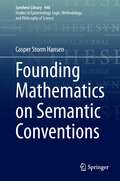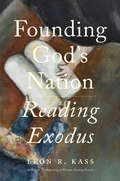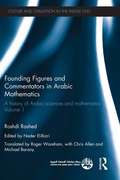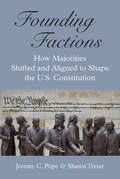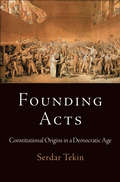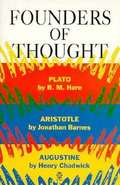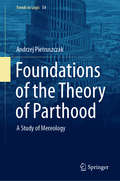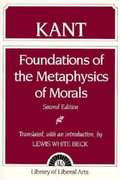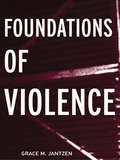- Table View
- List View
Four Thousand Weeks: Time Management for Mortals
by Oliver BurkemanAN INSTANT NEW YORK TIMES BESTSELLER"Provocative and appealing . . . well worth your extremely limited time." —Barbara Spindel, The Wall Street JournalThe average human lifespan is absurdly, insultingly brief. Assuming you live to be eighty, you have just over four thousand weeks.Nobody needs telling there isn’t enough time. We’re obsessed with our lengthening to-do lists, our overfilled inboxes, work-life balance, and the ceaseless battle against distraction; and we’re deluged with advice on becoming more productive and efficient, and “life hacks” to optimize our days. But such techniques often end up making things worse. The sense of anxious hurry grows more intense, and still the most meaningful parts of life seem to lie just beyond the horizon. Still, we rarely make the connection between our daily struggles with time and the ultimate time management problem: the challenge of how best to use our four thousand weeks.Drawing on the insights of both ancient and contemporary philosophers, psychologists, and spiritual teachers, Oliver Burkeman delivers an entertaining, humorous, practical, and ultimately profound guide to time and time management. Rejecting the futile modern fixation on “getting everything done,” Four Thousand Weeks introduces readers to tools for constructing a meaningful life by embracing finitude, showing how many of the unhelpful ways we’ve come to think about time aren’t inescapable, unchanging truths, but choices we’ve made as individuals and as a society—and that we could do things differently.
Four Thousand Weeks: Time Management for Mortals
by Oliver Burkeman&“This is the most important book ever written about time management. Oliver Burkeman offers a searing indictment of productivity hacking and profound insights on how to make the best use of our scarcest, most precious resource. His writing will challenge you to rethink many of your beliefs about getting things done-and you&’ll be wiser because of it.&” -Adam Grant, #1 New York Times bestselling author of Think Again and host of WorkLife Time is our biggest worry: there is too little of it. The award-winning, renowned Guardian columnist Oliver Burkeman offers a lively, entertaining philosophical guide to time and time management, setting aside superficial efficiency solutions in favour of reckoning with and finding joy in the finitude of human life.The average human lifespan is absurdly, insultingly brief. Assuming you live to be eighty, you have just over four thousand weeks.Nobody needs telling there isn't enough time. We're obsessed with our lengthening to-do lists, our overfilled inboxes, work-life balance, and the ceaseless struggle against distraction; and we're deluged with advice on becoming more productive and efficient, plus "lifehacks" to optimize our days. But such techniques often just end up making things worse. The sense of anxious hurry grows more intense, and still the most meaningful parts of life seem to lie just beyond the horizon. Still, we rarely make the connection between our daily struggles with time and the ultimate time management problem: the challenge of how best to use our four thousand weeks.Drawing on the insights of ancient and contemporary philosophers, psychologists, and spiritual teachers, Oliver Burkeman delivers an entertaining, humorous, practical, and ultimately profound guide to time and time management. Rejecting the futile modern obsession with "getting everything done," he introduces readers to tools for constructing a meaningful life, showing how many of the unhelpful ways we've come to think about time aren't inescapable, unchanging truths, but choices we've made, as individuals and as a society--and that we could do things differently.
Four Texts on Socrates: Plato's Euthyphro, Apology, and Crito and Aristophanes' Clouds
by Thomas G. West Grace S. WestWidely adopted for classroom use, this book offers translations of four major works of ancient Greek literature which treat the life and thought of Socrates, focusing particularly on his trial and defense (three dialogues by Plato: Euthyphro, Apology of Socrates, and Crito) and on the charges against Socrates (Aristophanes' comedy Clouds). <p><p> This is the only collection of the three Platonic dialogues that also includes Clouds, a work that is fundamental for understanding the thought of Socrates in relation to the Athenian political community and to Greek poetry. Thomas G. West's introduction provides an overview of the principal themes and arguments of the four works. There are extensive explanatory notes to the translations. In their translations, the Wests capture successfully the simplicity and vigor of straightforward Greek diction. They strive for as high a degree of accuracy as possible, subordinating concerns for elegance and smoothness to the goal of producing the most faithful and most reliable English versions of these texts. <p><p> For this new edition, Thomas West has revised the introduction and updated the annotated bibliography, which includes the best of the secondary literature on Socrates and on the texts included in this book.
Four Texts on Socrates: Plato's Euthyphro, Apology and Crito, and Aristophanes' Clouds (Revised Edition)
by Plato Aristophanes Thomas G. West Grace S. WestWidely adopted for classroom use, this book offers translations of four major works of ancient Greek literature which treat the life and thought of Socrates, focusing particularly on his trial and defense (the platonic dialogues Euthyphro, Apology of Socrates, and Crito) and on the charges against Socrates (Aristophanes' comedy Clouds). This is the only collection of the three Platonic dialogues that also includes Clouds, a work that is fundamental for understanding the thought of Socrates in relation to the Athenian political community and to Greek poetry. Thomas G. West's introduction provides an overview of the principal themes and arguments of the four works. There are extensive explanatory notes to the translations. For this new edition, Thomas West has revised the introduction and updated the annotated bibliography, which includes the best of the secondary literature on Socrates and on the texts included in this book. In their translations, the Wests capture successfully the simplicity and vigor of straightforward Greek diction. They strive for as high a degree of accuracy as possible, subordinating concerns for elegance and smoothness to the goal of producing the most faithful and most reliable English versions of these texts.
Four Seminars (Studies in Continental Thought)
by Martin HeideggerThe philosopher presents a stimulating overview of his work, its intellectual roots, and its relationship to the work of other twentieth century thinkers.In Four Seminars, Heidegger reviews the entire trajectory of his thought and offers unique perspectives on fundamental aspects of his work. First published in French in 1976, these seminars were translated into German with Heidegger’s approval and reissued in 1986 as part of his Gesamtausgabe, volume 15. Topics considered include the Greek understanding of presence, the ontological difference, the notion of system in German Idealism, the power of naming, the problem of technology, danger, and the event.Heidegger’s engagements with his philosophical forebears—Parmenides, Heraclitus, Kant, and Hegel—continue in surprising dialogues with his contemporaries—Husserl, Marx, and Wittgenstein. While providing important insights into how Heidegger conducted his lectures, these seminars show him in his maturity, reflecting back on his philosophical path.
Four Pragmatists: A Critical Introduction to Peirce, James, Mead, and Dewey (Routledge Revivals)
by Israel SchefflerFirst published in 1974, this book is a critical introduction to the work of four quintessential pragmatist philosophers: Charles Sanders Peirce, William James, George Herbert Mead and John Dewey. Alongside providing a general historical and biographical account of the pragmatist movement, the work offers an in depth critical response to the philosophical doctrines of the four main thinkers of the pragmatist movement, with reference to the theories of meaning, knowledge and conduct which have come to define pragmatism.
Four Philosophers and the Bomb: Russell, Aron, Jaspers, and Anders on Atomic Warfare (Routledge Studies in Social and Political Thought)
by Alberto Castelli Giunia Gatta Micaela Latini Francesco RaschiIn this book, Alberto Castelli, Giunia Gatta, Micaela Latini, and Francesco Raschi examine how four prominent intellectuals of the 20th century (Bertrand Russell, Karl Jaspers, Raymond Aron, and Günther Anders) understood atomic warfare. With a chapter devoted to the philosophical ideas of each thinker and how they understood and interpreted war, the authors analyze the historic-political context in which these ideas emerged and what they proposed to avoid a nuclear disaster.Four Philosophers and the Bomb will be of interest to students and researchers of peace studies, international relations, political philosophy, and moral philosophy.
Four Phenomenological Philosophers: Husserl, Heidegger, Sartre, Merleau-Ponty
by Christopher MacannMacann guides the student through the major texts of the four great thinkers of the phenomenological movement.
Four Meditations on Happiness
by Michael HampeIn this original and thought-provoking book, philosopher Michael Hampe sets out to help us understand happiness. The right and proper path to a happy life is a topic that has been debated for millennia. There are many theories, from those of ancient philosophy to those of modern neuroscience, but can any one of them ultimately tell us how the objective of a perfectly fulfilled life might be achieved? By telling the story of two friends—the unhappy philosopher Stanley Low and the happy gardener Gabriel Kolk—alongside a presentation of four essays that examine prominent and very plausible theories of happiness, Michael Hampe illustrates that there is no easy answer to our search for unadulterated bliss. This is an erudite and illuminating investigation into one of mankind's most elusive quests, one that allows us to reconsider what it means to be happy.
Four Lives: A Celebration of Raymond Smullyan
by Raymond M. Smullyan Jason RosenhouseThis "best of" collection of works by Raymond Smullyan features excerpts from his published writings, including logic puzzles, explorations of mathematical logic and paradoxes, retrograde analysis chess problems, jokes and anecdotes, and meditations on the philosophy of religion. In addition, numerous personal tributes salute this celebrated professor, author, and logic scholar who is also a magician and musician.
Four Jews on Parnassus—a Conversation: Benjamin, Adorno, Scholem, Schönberg
by Carl DjerassiThis book features a CD of rarely performed music, including a specially commissioned rap by Erik Weiner of Walter Benjamin's "Thesis on the Philosophy of History." Theodor W. Adorno was the prototypical German Jewish non-Jew, Walter Benjamin vacillated between German Jew and Jewish German, Gershom Scholem was a committed Zionist, and Arnold Schönberg converted to Protestantism for professional reasons but later returned to Judaism. Carl Djerassi, himself a refugee from Hitler's Austria, dramatizes a dialogue between these four men in which they discuss fraternity, religious identity, and legacy as well as reveal aspects of their lives-notably their relations with their wives-that many have ignored, underemphasized, or misrepresented. The desire for canonization and the process by which it is obtained are the underlying themes of this dialogue, with emphasis on Paul Klee's Angelus Novus (1920), a canonized work that resonated deeply with Benjamin, Adorno, and Scholem (and for which Djerassi and Gabrielle Seethaler present a revisionist and richly illustrated interpretation). Basing his dialogue on extensive archival research and interviews, Djerassi concludes with a daring speculation on the putative contents of Benjamin's famous briefcase, which disappeared upon his suicide.
Four Jews on Parnassus--A Conversation: Benjamin, Adorno, Scholem, Schönberg
by Carl DjerassiTheodor W. Adorno was the prototypical German Jewish non-Jew, Walter Benjamin vacillated between German Jew and Jewish German, Gershom Scholem was a committed Zionist, and Arnold Schönberg converted to Protestantism for professional reasons but later returned to Judaism. Carl Djerassi, himself a refugee from Hitler's Austria, dramatizes a dialogue between these four men in which they discuss fraternity, religious identity, and legacy as well as reveal aspects of their lives--notably their relations with their wives--that many have ignored, underemphasized, or misrepresented. The desire for canonization and the process by which it is obtained are the underlying themes of this dialogue, with emphasis on Paul Klee's Angelus Novus (1920), a canonized work that resonated deeply with Benjamin, Adorno, and Scholem (and for which Djerassi and Gabrielle Seethaler present a revisionist and richly illustrated interpretation). Basing his dialogue on extensive archival research and interviews, Djerassi concludes with a daring speculation on the putative contents of Benjamin's famous briefcase, which disappeared upon his suicide.
Four Colors Suffice: How the Map Problem Was Solved - Revised Color Edition (Princeton Science Library #128)
by Robin WilsonOn October 23, 1852, Professor Augustus De Morgan wrote a letter to a colleague, unaware that he was launching one of the most famous mathematical conundrums in history--one that would confound thousands of puzzlers for more than a century. This is the amazing story of how the "map problem" was solved. The problem posed in the letter came from a former student: What is the least possible number of colors needed to fill in any map (real or invented) so that neighboring counties are always colored differently? This deceptively simple question was of minimal interest to cartographers, who saw little need to limit how many colors they used. But the problem set off a frenzy among professional mathematicians and amateur problem solvers, among them Lewis Carroll, an astronomer, a botanist, an obsessive golfer, the Bishop of London, a man who set his watch only once a year, a California traffic cop, and a bridegroom who spent his honeymoon coloring maps. In their pursuit of the solution, mathematicians painted maps on doughnuts and horseshoes and played with patterned soccer balls and the great rhombicuboctahedron. It would be more than one hundred years (and countless colored maps) later before the result was finally established. Even then, difficult questions remained, and the intricate solution--which involved no fewer than 1,200 hours of computer time--was greeted with as much dismay as enthusiasm. Providing a clear and elegant explanation of the problem and the proof, Robin Wilson tells how a seemingly innocuous question baffled great minds and stimulated exciting mathematics with far-flung applications. This is the entertaining story of those who failed to prove, and those who ultimately did prove, that four colors do indeed suffice to color any map. This new edition features many color illustrations. It also includes a new foreword by Ian Stewart on the importance of the map problem and how it was solved.
Four Arts of Photography: An Essay in Philosophy (New Directions in Aesthetics)
by Dominic McIver LopesFour Arts of Photography explores the history of photography through the lens of philosophy and proposes a new scholarly understanding of the art form for the 21st century. Re-examines the history of art photography through four major photographic movements and with case studies of representative images Employs a top-down, theory to case approach, as well as a bottom-up, case to theory approach Advances a new theory regarding the nature of photography that is grounded in technology but doesn’t place it in opposition to painting Includes commentaries by two leading philosophers of photography, Diarmuid Costello and Cynthia A. Freeland
Four Ages of Understanding: The First Postmodern Survey of Philosophy from Ancient Times to the Turn of the Twenty-First Century (Toronto Studies in Semiotics and Communication)
by John DeelyThis book redraws the intellectual map and sets the agenda in philosophy for the next fifty or so years. By making the theory of signs the dominant theme in Four Ages of Understanding, John Deely has produced a history of philosophy that is innovative, original, and complete. The first full-scale demonstration of the centrality of the theory of signs to the history of philosophy, Four Ages of Understanding provides a new vantage point from which to review and reinterpret the development of intellectual culture at the threshold of "globalization". Deely examines the whole movement of past developments in the history of philosophy in relation to the emergence of contemporary semiotics as the defining moment of Postmodernism. Beginning traditionally with the Pre-Socratic thinkers of early Greece, Deely gives an account of the development of the notion of signs and of the general philosophical problems and themes which give that notion a context through four ages: Ancient philosophy, covering initial Greek thought; the Latin age, philosophy in European civilization from Augustine in the 4th century to Poinsot in the 17th; the Modern period, beginning with Descartes and Locke; and the Postmodern period, beginning with Charles Sanders Peirce and continuing to the present. Reading the complete history of philosophy in light of the theory of the sign allows Deely to address the work of thinkers never before included in a general history, and in particular to overcome the gap between Ockham and Descartes which has characterized the standard treatments heretofore. One of the essential features of the book is the way in which it shows how the theme of signs opens a perspective for seeing the Latin Age from its beginning with Augustine to the work of Poinsot as an indigenous development and organic unity under which all the standard themes of ontology and epistemology find a new resolution and place. A magisterial general history of philosophy, Deely's book provides both a strong background to semiotics and a theoretical unity between philosophy's history and its immediate future. With Four Ages of Understanding Deely sets a new agenda for philosophy as a discipline entering the 21st century.
Founding Psychoanalysis Phenomenologically
by Dieter Lohmar Jagna BrudzinskaThe present anthology seeks to give an overview of the different approaches to establish a relation between phenomenology and psychoanalysis, primarily from the viewpoint of current phenomenological research. Already during the lifetimes of the two disciplines' founders, Edmund Husserl (1859 - 1938) and Sigmund Freud (1856 - 1939), phenomenological and phenomenologically inspired authors were advancing psychoanalytic theses. For both traditions, the Second World War presented a painful and devastating disruption of their development and mutual exchange. During the postwar period, phenomenologists, especially in France, revisited psychoanalytic topics. Thus, in the so-called second generation of phenomenology there developed an intensive reception of the psychoanalytic tradition, one that finds its expression even today in current hermeneutic, postmodern and poststructuralist conceptions. But also in more recent phenomenological research we find projects concentrated systematically on psychoanalysis and its theses. In this context, the status of psychoanalysis as a science of human experience is discussed anew, now approached on the 'first person' basis of a phenomenological understanding of subjective experience. In such approaches, phenomena like incorporation, phantasy, emotion and the unconscious are discussed afresh. These topics, important for modern phenomenology as well as for psychoanalysis, are examined in the context of the constitution of the human person as well as of our intersubjective world. The analyses are also interdisciplinary, making use of connections with modern medicine, psychiatry and psychotherapy. The systematic investigations are enriched by historical analysis and research in the internal development of the disciplines involved. The volume presents recent work of internationally recognized researchers - phenomenologically oriented philosophers, psychoanalysts and psychotherapists - who work in the common field of the two disciplines. The editors hope that this selection will encourage further systematic collaboration between phenomenology and psychoanalysis
Founding Mathematics on Semantic Conventions (Synthese Library #446)
by Casper Storm HansenThis book presents a new nominalistic philosophy of mathematics: semantic conventionalism. Its central thesis is that mathematics should be founded on the human ability to create language – and specifically, the ability to institute conventions for the truth conditions of sentences.This philosophical stance leads to an alternative way of practicing mathematics: instead of “building” objects out of sets, a mathematician should introduce new syntactical sentence types, together with their truth conditions, as he or she develops a theory.Semantic conventionalism is justified first through criticism of Cantorian set theory, intuitionism, logicism, and predicativism; then on its own terms; and finally, exemplified by a detailed reconstruction of arithmetic and real analysis.Also included is a simple solution to the liar paradox and the other paradoxes that have traditionally been recognized as semantic. And since it is argued that mathematics is semantics, this solution also applies to Russell’s paradox and the other mathematical paradoxes of self-reference.In addition to philosophers who care about the metaphysics and epistemology of mathematics or the paradoxes of self-reference, this book should appeal to mathematicians interested in alternative approaches.
Founding God’s Nation: Reading Exodus
by Leon R KassIn this long-awaited follow-up to his 2003 book on Genesis, humanist scholar Leon Kass explores how Exodus raises and then answers the central political questions of what defines a nation and how a nation should govern itself. Considered by some the most important book in the Hebrew Bible, Exodus tells the story of the Jewish people from their enslavement in Egypt, through their liberation under Moses&’s leadership, to the covenantal founding at Sinai and the building of the Tabernacle. In Kass&’s analysis, these events began the slow process of learning how to stop thinking like slaves and become an independent people. The Israelites ultimately founded their nation on three elements: a shared narrative that instills empathy for the poor and the suffering, the uplifting rule of a moral law, and devotion to a higher common purpose. These elements, Kass argues, remain the essential principles for any freedom-loving nation today.
Founding Figures and Commentators in Arabic Mathematics: A History of Arabic Sciences and Mathematics Volume 1 (Culture and Civilization in the Middle East)
by Roshdi RashedIn this unique insight into the history and philosophy of mathematics and science in the mediaeval Arab world, the eminent scholar Roshdi Rashed illuminates the various historical, textual and epistemic threads that underpinned the history of Arabic mathematical and scientific knowledge up to the seventeenth century. The first of five wide-ranging and comprehensive volumes, this book provides a detailed exploration of Arabic mathematics and sciences in the ninth and tenth centuries. Extensive and detailed analyses and annotations support a number of key Arabic texts, which are translated here into English for the first time. In this volume Rashed focuses on the traditions of celebrated polymaths from the ninth and tenth centuries ‘School of Baghdad’ - such as the Banū Mūsā, Thābit ibn Qurra, Ibrāhīm ibn Sinān, Abū Ja´far al-Khāzin, Abū Sahl Wayjan ibn Rustām al-Qūhī - and eleventh-century Andalusian mathematicians like Abū al-Qāsim ibn al-Samh, and al-Mu’taman ibn Hūd. The Archimedean-Apollonian traditions of these polymaths are thematically explored to illustrate the historical and epistemological development of ‘infinitesimal mathematics’ as it became more clearly articulated in the eleventh-century influential legacy of al-Hasan ibn al-Haytham (‘Alhazen’). Contributing to a more informed and balanced understanding of the internal currents of the history of mathematics and the exact sciences in Islam, and of its adaptive interpretation and assimilation in the European context, this fundamental text will appeal to historians of ideas, epistemologists, mathematicians at the most advanced levels of research.
Founding Factions: How Majorities Shifted and Aligned to Shape the U.S. Constitution
by Jeremy C Pope Shawn TreierThe fundamental importance of the 1787 Constitutional Convention continues to affect contemporary politics. The Constitution defines the structure and limits of the American system of government, and it organizes contemporary debates about policy and legal issues—debates that explicitly invoke the intentions and actions of those delegates to the Convention. Virtually all scholarship emphasizes the importance of compromise between key actors or factions at the Convention. In truth, the deep structure of voting at the Convention remains somewhat murky because the traditional stories are incomplete. There were three key factions at the Convention, not two. The alliance of the core reformers with the slave interests helped change representation and make a stronger national government. When it came time to create a strong executive, a group of small state delegates provided the crucial votes. Traditional accounts gloss over the complicated coalition politics that produced these important compromises, while this book shows the specific voting alignments. It is true that the delegates came with common purposes, but they were divided by both interests and ideas into three crosscutting factions. There was no persistent dominant coalition of reformers or nationalists; rather, there was a series of minority factions allying with one another on the major issues to fashion the compromise. Founding Factions helps us understand the nature of shifting majorities and how they created the American government.
Founding Acts: Constitutional Origins in a Democratic Age
by Serdar TekinAll democratic constitutions feature "the people" as their author and ultimate source of legitimacy. They claim to embody the political form that citizens are in some sense supposed to have given themselves. But in what sense, exactly? When does a constitution really or genuinely speak for the people? Such questions are especially pertinent to our present condition, where the voice of "the people" turns out to be irrevocably fragmented, and people themselves want to speak and be heard in their own voices.Founding Acts explores the relationship between constitutional claims of popular sovereignty and the practice of constitution-making in our pluralistic age. Serdar Tekin argues that the process of making a constitution, or its pedigree, is as morally and politically significant as its content. Consequently, democratic constitution-making is not only about making a democratic constitution but also about making it, as much as possible, democratically.Tekin develops two overarching arguments in support of this claim. First, citizen participation in the process of constitution-making is essential to the democratic legitimacy of a new constitution. Second, collective action, that is, the political experience of constructing public life together, is what binds diverse people into a democratic peoplehood. Bringing into dialogue a wide range of canonical and contemporary thinkers, Tekin examines historical realities extending from revolutionary America and France to contemporary South Africa and Germany.
Founders of Thought: Plato, Aristotle, Augustine
by Jonathan Barnes Henry Chadwick R. M. HareFounders of Thought offers introductions to three of the most influential intellects of classical antiquity: Plato, whose dialogues form the basis of the study of logic, metaphysics, and moral and political philosophy; Aristotle, polymath, tutor of Alexander the Great and "master of those who know"; and Augustine, the Christian convert who asked God to make him good, "but not yet." Brief, accessible, and written by outstanding scholars, these studies offer readers an introduction to the ideas and achievements of the thinkers whose works are essential to a full understanding of western thought and culture.
Foundations of the Theory of Parthood: A Study of Mereology (Trends in Logic #54)
by Andrzej PietruszczakThis is the first book to systematically study the weak systems of mereology. In its chapters, the author critically analyzes and explains core topics related to mereology, such as parthood without antisymmetry, non-existence of the zero element, and Leśniewski's notion of class and set. The book also delves into three theories of parthood: two concern the sum existence axioms, and the third contends with transitivity of parthood. This is the first systematic analysis of systems of mereology of its kind and is suitable for students, scholars, logicians, and mathematicians who wish to further their knowledge of mereology.Original polish publication “Podstawy teorii części” by The Nicolaus Copernicus University Press
Foundations of the Metaphysics of Morals
by Immanuel Kant Lewis White BeckImmanuel Kant is known for his philosphy of ethics in relation to taking actions according to a categorical imperative and with the intent of dutifulness, rather than acting on ones desires or expectations of outcomes. This book is considered to be a summary of Kant's philosophy of ethics, written for a wider audience than most of his other works. Still, it is Kant and it is philosophy, so it is pretty deep reading. This book also includes a short essay titled, What is Enlightenment. This book is translated from German, but still retains a few German words, along with the Latin words common in books of philosophy. In addition to the regular page numbers, this book also has page numbers from a standard edition of Kant's works. In the printed version, these numbers were in the margin. In this copy they are in the text next to the word they were nearest in the printed text. This means they are often in the middle of a sentance.
Foundations of Violence (Death and the Displacement of Beauty)
by Grace M. Jantzen Grace M JantzenThe pursuit of death and the love of death has characterized Western culture from Homeric times through centuries of Christianity, taking particular deadly shapes in Western postmodernity. This necrophilia shows itself in destruction and violence, in a focus on other worlds and degradation of this one, and in hatred of the body, sense and sexuality. In her major new book project Death and the Displacement of Beauty, Grace M. Jantzen seeks to disrupt this wish for death, opening a new acceptance of beauty and desire that makes it possible to choose life.Foundations of Violence enters the ancient world of Homer, Sophocles, Plato and Aristotle to explore the genealogy of violence in Western thought through its emergence in Greece and Rome. It uncovers origins of ideas of death from the 'beautiful death' of Homeric heroes to the gendered misery of war, showing the tensions between those who tried to eliminate fear of death by denying its significance, and those like Plotinus who looked to another world, seeking life and beauty in another realm.
